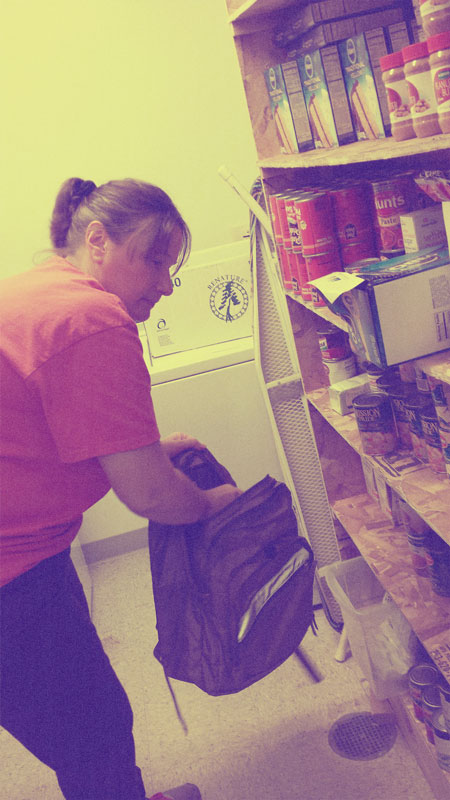At 2:55 on a Friday afternoon, the halls of New Sweden Consolidated School sit silent and empty, except for a cluster of backpacks ranged along the wall outside the main office. With a rush of sound, the door from the playground bursts open, and students stream in from afternoon recess, gathering belongings and hurrying toward the main doors and the freedom of the weekend. Girls in their early teens sass each other and dodge tiny pre-kindergarten students toddling along with shoelaces trailing.
Here and there a student pauses to grab the handle of a waiting backpack before continuing out into the November cold and the waiting bus. These students are participants in the school’s Take Home Program and those packs are crammed with enough food to stave off hunger for a weekend.
Located in Aroostook County, Maine’s largest, most rural, and northernmost county, New Sweden Consolidated School serves 56 students from pre-kindergarten to Grade 8, in multi-grade classrooms. Many of those students live below the federal poverty level, with 75% of the school population qualifying for free or reduced school lunch, based on federal income guidelines.
The school also serves as the community hub. The town hosts only a handful of businesses, none of which has more than a couple employees. In New Sweden, any happening, regardless of size or import, originates from or takes place at the school.
Three years ago, Food Service Director Melanie Lagasse attended a workshop where she heard others discussing a program that sent food home with students for weekends. A lightbulb went on.
“Kids were putting food in their pockets,” she remembers. “Breakfast, lunch, it didn’t matter. They told me they needed to make sure they had snacks when they got home. I knew there was a serious issue.”
In 2014, Lagasse approached the district administration and pitched her idea. Then she began assembling food and raising money. She made phone calls, sent letters to local businesses, and required her high school son’s cross country team to bring $5 worth of non-perishable food to the fourth team dinner she hosted that year. With backpacks donated by L.L. Bean and the local American Legion, she set out to thwart child hunger.
Poverty and hunger are prevalent in Aroostook County. According to Jason Parent, Director of Aroostook County Action Program, 26.5% of Aroostook’s children are living with food insecurity, higher than the state average of 23.5%. Even more stark, 24.6% of children are living below the federal poverty level, significantly above the state average of 18.8%.
“The rurality of the county impacts the accessibility of food stores and the quality of food available,” Parent says. “It’s often difficult for folks who have transportation and mobility issues.”
These numbers seem to fit with a national trend of increasing hunger. The Annie E. Casey Foundation’s KIDS COUNT data project reports that in 2014, 20% of children in America faced food insecurity, a two percent increase over a decade, yet still lower than that reported in Aroostook County.
The economic profile of Aroostook County wasn’t always this bleak. The construction of Loring Air Force Base in 1947 brought jobs and population to northern Maine. Loring was the closest base to Europe in the continental United States, and at its height was one of the nation’s largest. At times, civilian and military jobs at Loring numbered almost 10,000, and payrolls totaled $80 million.
In 1994, Loring Air Force Base closed, and with it went 15% of Aroostook County’s population, and much of its economic hopes.

With over 43 million Americans living in poverty, there are a lot of “Aroostooks” out there. President-elect Donald Trump’s economic plan focuses on job creation—cutting taxes and government regulations as a mechanism for spurring growth. But will these be living wage jobs like Loring Air Force Base provided, or will programs like Take Home still be necessary?
Lagasse remembers the area thriving when she was growing up.
“The base closure was huge to this area,” she says. “Before that, there were a lot more businesses opened in town, and they were always busy. The poverty level has absolutely changed. It’s gotten worse.”
The six to eight hours Lagasse spends on the Take Home Program each week are above and beyond her job description. Facing such a desolate reality, one might think that she, and other Aroostook residents, would leave. Driven by a passion to eradicate child hunger, however, Lagasse is determined to stay and to make an impact.
When asked why this program matters, Lagasse looks away, quiet for a long moment.
Then she turns back. She’s crying.
“Every child has a right to be a child and a right to succeed. When kids have to wonder where their next meal is coming from, they can’t function, because they can’t focus.” She pauses, fighting tears. “If this is my contribution, I hope it works for them.”
Kasey Grieco McNeally lives in northern Maine, where she is active in her community and raises two young sons. She has taught writing and literature at Emerson College, Northern Maine Community College, and the University of Maine at Presque Isle. Her writing has appeared in The Forecaster, The Times Record, Portland Magazine, The MacGuffin, and Echoes. She’s currently the Deputy Town Clerk for the town of New Sweden.

